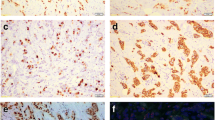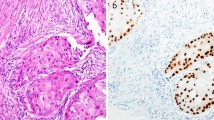Abstract
The prognostic value of androgen receptor (AR) and its related molecules in breast cancer is not well characterized. We retrospectively investigated 120 ER+ and 120 ER− invasive breast cancers of 240 women, who were treated at our institution between January 2008 and December 2009. We excluded in situ, recurrent, metastatic, and bilateral carcinomas as well as non-epithelial lesions. Median follow-up was 74 months. Immunohistochemical assessment of expression of AR and metastasis-associated protein-1 (MTA1) resulted in 59.2 % (n = 142) AR+ and 36.7 % (n = 88) high MTA1 expressing (MTA1High) carcinomas. MTA1High tumors were significantly more often ER−, while AR+ tumors were significantly more often HER2+ (p < 0.01). MTA1High/ER− tumors were more often AR−/HER2− (p < 0.01). Patients with an AR+/ER+ tumor had better disease-free survival (DFS; p = 0.011). Patients with an ER−/MTA1High tumor had significantly shorter DFS (p = 0.006) as well as patients with an AR+/HER2+ tumor (p < 0.01). In Cox models, AR expression (HR, 0.248; 95 % CI, 0.086–0.716) and lymph node status (HR, 6.401; 95 % CI, 1.428–28.686) were independent predictors for DFS in ER+ cancers, whereas AR+/HER2+ expression status (HR, 2.927; 95 % CI, 1.256–6.821) and lymph node status (HR, 2.690; 95 % CI, 1.041–7.840) were independent predictors for DFS in ER− cancers. We show that AR might be an additional marker for endocrine responsiveness in ER+ cancers and suggests that blocking MTA1 might be an effective way to inhibit AR/HER2 signaling in ER− breast cancer.




Similar content being viewed by others
References
Ni M, Chen Y, Lim E, Wimberly H, Bailey Shannon T, Imai Y, Rimm David L, Shirley Liu X, Brown M (2011) Targeting androgen receptor in estrogen receptor-negative breast cancer. Cancer Cell 20(1):119–131. doi:10.1016/j.ccr.2011.05.026
Dowsett M, Dunbier AK (2008) Emerging biomarkers and new understanding of traditional markers in personalized therapy for breast cancer. Clin Cancer Res 14(24):8019–8026. doi:10.1158/1078-0432.CCR-08-0974
Micello D, Marando A, Sahnane N, Riva C, Capella C, Sessa F (2010) Androgen receptor is frequently expressed in HER2-positive, ER/PR-negative breast cancers. Virchows Arch 457(4):467–476. doi:10.1007/s00428-010-0964-y
Moinfar F, Okcu M, Tsybrovskyy O, Regitnig P, Lax SF, Weybora W, Ratschek M, Tavassoli FA, Denk H (2003) Androgen receptors frequently are expressed in breast carcinomas: potential relevance to new therapeutic strategies. Cancer 98(4):703–711. doi:10.1002/cncr.11532
Niemeier LA, Dabbs DJ, Beriwal S, Striebel JM, Bhargava R (2010) Androgen receptor in breast cancer: expression in estrogen receptor-positive tumors and in estrogen receptor-negative tumors with apocrine differentiation. Mod Pathol 23(2):205–212. doi:10.1038/modpathol.2009.159
Ogawa Y, Hai E, Matsumoto K, Ikeda K, Tokunaga S, Nagahara H, Sakurai K, Inoue T, Nishiguchi Y (2008) Androgen receptor expression in breast cancer: relationship with clinicopathological factors and biomarkers. Int J Clin Oncol 13(5):431–435. doi:10.1007/s10147-008-0770-6
Lawton TJ, Hawes SE, Linden H, Swanson PE, Agoff SN (2003) Androgen receptor expression in estrogen receptor-negative breast cancer immunohistochemical, clinical, and prognostic associations. Am J Clin Pathol 120(5):725–731. doi:10.1309/42f00d0djd0j5edt
Chia KM, Liu J, Francis GD, Naderi A (2011) A feedback loop between androgen receptor and ERK signaling in estrogen receptor-negative breast cancer. Neoplasia 13(2):154–166. doi:10.1593/neo.101324
Millard CJ, Fairall L, Schwabe JW (2014) Towards an understanding of the structure and function of MTA1. Cancer Metastasis Rev 33(4):857–867. doi:10.1007/s10555-014-9513-5
Li DQ, Pakala SB, Nair SS, Eswaran J, Kumar R (2012) Metastasis-associated protein 1/nucleosome remodeling and histone deacetylase complex in cancer. Cancer Res 72(2):387–394. doi:10.1158/0008-5472.CAN-11-2345
Toh Y, Nicolson GL (2009) The role of the MTA family and their encoded proteins in human cancers: molecular functions and clinical implications. Clin Exp Metastasis 26(3):215–227. doi:10.1007/s10585-008-9233-8
Sen N, Gui B, Kumar R (2014) Physiological functions of MTA family of proteins. Cancer Metastasis Rev 33(4):869–877. doi:10.1007/s10555-014-9514-4
Jang KS, Paik SS, Chung H, Oh YH, Kong G (2006) MTA1 overexpression correlates significantly with tumor grade and angiogenesis in human breast cancers. Cancer Sci 97(5):374–379. doi:10.1111/j.1349-7006.2006.00186.x
Wang RA (2014) MTA1—a stress response protein: a master regulator of gene expression and cancer cell behavior. Cancer Metastasis Rev 33(4):1001–1009. doi:10.1007/s10555-014-9525-1
Bagheri-Yarmand R, Talukder AH, Wang RA, Vadlamudi RK, Kumar R (2004) Metastasis-associated protein 1 deregulation causes inappropriate mammary gland development and tumorigenesis. Development 131(14):3469–3479. doi:10.1242/dev.01213
Pakala SB, Rayala SK, Wang RA, Ohshiro K, Mudvari P, Reddy SD, Zheng Y, Pires R, Casimiro S, Pillai MR, Costa L, Kumar R (2013) MTA1 promotes STAT3 transcription and pulmonary metastasis in breast cancer. Cancer Res 73(12):3761–3770. doi:10.1158/0008-5472.CAN-12-3998
Mazumdar A, Wang RA, Mishra SK, Adam L, Bagheri-Yarmand R, Mandal M, Vadlamudi RK, Kumar R (2001) Transcriptional repression of oestrogen receptor by metastasis-associated protein 1 corepressor. Nat Cell Biol 3(1):30–37. doi:10.1038/35050532
Sobin LH, Gospodarowicz MK, Wittekind C (2009) TNM classification of malignant tumours, 7th edn. Wiley, Chichester
Edge SB, Byrd DR, Compton CC, et al. (eds) (2010) AJCC cancer staging handbook, 7th edn. Springer, New York
Elston CW, Ellis IO (1991) Pathological prognostic factors in breast cancer. I. The value of histological grade in breast cancer: experience from a large study with long-term follow-up. Histopathology 19(5):403–410
Pathologists’ Guideline Recommendations for Immunohistochemical Testing of Estrogen and Progesterone Receptors in Breast Cancer (2010) Breast Care (Basel) 5(3):185–187
Wolff AC, Hammond ME, Hicks DG, Dowsett M, McShane LM, Allison KH, Allred DC, Bartlett JM, Bilous M, Fitzgibbons P, Hanna W, Jenkins RB, Mangu PB, Paik S, Perez EA, Press MF, Spears PA, Vance GH, Viale G, Hayes DF, American Society of Clinical O, College of American P (2013) Recommendations for human epidermal growth factor receptor 2 testing in breast cancer: American Society of Clinical Oncology/College of American Pathologists clinical practice guideline update. J Clin Oncol 31(31):3997–4013. doi:10.1200/JCO.2013.50.9984
Park S, Koo JS, Kim MS, Park HS, Lee JS, Lee JS, Kim SI, Park BW, Lee KS (2011) Androgen receptor expression is significantly associated with better outcomes in estrogen receptor-positive breast cancers. Ann Oncol 22(8):1755–1762. doi:10.1093/annonc/mdq678
Nicolás Díaz-Chico B, Germán Rodríguez F, González A, Ramírez R, Bilbao C, Cabrera de León A, Aguirre Jaime A, Chirino R, Navarro D, Díaz-Chico JC (2007) Androgens and androgen receptors in breast cancer. J Steroid Biochem Mol Biol 105(1–5):1–15. doi:10.1016/j.jsbmb.2006.11.019
Higgins MJ, Wolff AC (2010) The androgen receptor in breast cancer: learning from the past. Breast Cancer Res Treat 124(3):619–621. doi:10.1007/s10549-010-0864-5
Naderi A, Hughes-Davies L (2008) A functionally significant cross-talk between androgen receptor and ErbB2 pathways in estrogen receptor negative breast cancer. Neoplasia 10(6):542–548. doi:10.1593/neo.08274
Cheng CW, Liu YF, Yu JC, Wang HW, Ding SL, Hsiung CN, Hsu HM, Shieh JC, Wu PE, Shen CY (2012) Prognostic significance of cyclin D1, beta-catenin, and MTA1 in patients with invasive ductal carcinoma of the breast. Ann Surg Oncol 19(13):4129–4139. doi:10.1245/s10434-012-2541-x
Sharma G, Mirza S, Parshad R, Srivastava A, Gupta SD, Pandya P, Ralhan R (2010) Clinical significance of Maspin promoter methylation and loss of its protein expression in invasive ductal breast carcinoma: correlation with VEGF-A and MTA1 expression. Tumor Biol 32(1):23–32. doi:10.1007/s13277-010-0087-8
Martin MD, Hilsenbeck SG, Mohsin SK, Hopp TA, Clark GM, Osborne CK, Allred DC, O’Connell P (2006) Breast tumors that overexpress nuclear metastasis-associated 1 (MTA1) protein have high recurrence risks but enhanced responses to systemic therapies. Breast Cancer Res Treat 95(1):7–12. doi:10.1007/s10549-005-9016-8
Salot S, Gude R (2013) MTA1-mediated transcriptional repression of SMAD7 in breast cancer cell lines. Eur J Cancer 49(2):492–499. doi:10.1016/j.ejca.2012.06.019
Park S, Koo J, Park HS, Kim JH, Choi SY, Lee JH, Park BW, Lee KS (2010) Expression of androgen receptors in primary breast cancer. Ann Oncol 21(3):488–492. doi:10.1093/annonc/mdp510
Castellano I, Allia E, Accortanzo V, Vandone AM, Chiusa L, Arisio R, Durando A, Donadio M, Bussolati G, Coates AS, Viale G, Sapino A (2010) Androgen receptor expression is a significant prognostic factor in estrogen receptor positive breast cancers. Breast Cancer Res Treat 124(3):607–617. doi:10.1007/s10549-010-0761-y
Castellano I, Chiusa L, Vandone AM, Beatrice S, Goia M, Donadio M, Arisio R, Muscara F, Durando A, Viale G, Cassoni P, Sapino A (2013) A simple and reproducible prognostic index in luminal ER-positive breast cancers. Ann Oncol 24(9):2292–2297. doi:10.1093/annonc/mdt183
Macedo LF, Guo Z, Tilghman SL, Sabnis GJ, Qiu Y, Brodie A (2006) Role of androgens on MCF-7 breast cancer cell growth and on the inhibitory effect of letrozole. Cancer Res 66(15):7775–7782. doi:10.1158/0008-5472.CAN-05-3984
Peters AA, Buchanan G, Ricciardelli C, Bianco-Miotto T, Centenera MM, Harris JM, Jindal S, Segara D, Jia L, Moore NL, Henshall SM, Birrell SN, Coetzee GA, Sutherland RL, Butler LM, Tilley WD (2009) Androgen receptor inhibits estrogen receptor-alpha activity and is prognostic in breast cancer. Cancer Res 69(15):6131–6140. doi:10.1158/0008-5472.CAN-09-0452
Farmer P, Bonnefoi H, Becette V, Tubiana-Hulin M, Fumoleau P, Larsimont D, Macgrogan G, Bergh J, Cameron D, Goldstein D, Duss S, Nicoulaz AL, Brisken C, Fiche M, Delorenzi M, Iggo R (2005) Identification of molecular apocrine breast tumours by microarray analysis. Oncogene 24(29):4660–4671. doi:10.1038/sj.onc.1208561
Doane AS, Danso M, Lal P, Donaton M, Zhang L, Hudis C, Gerald WL (2006) An estrogen receptor-negative breast cancer subset characterized by a hormonally regulated transcriptional program and response to androgen. Oncogene 25(28):3994–4008. doi:10.1038/sj.onc.1209415
Lehmann-Che J, Hamy AS, Porcher R, Barritault M, Bouhidel F, Habuellelah H, Leman-Detours S, de Roquancourt A, Cahen-Doidy L, Bourstyn E, de Cremoux P, de Bazelaire C, Albiter M, Giacchetti S, Cuvier C, Janin A, Espie M, de The H, Bertheau P (2013) Molecular apocrine breast cancers are aggressive estrogen receptor negative tumors overexpressing either HER2 or GCDFP15. Breast Cancer Res 15(3):R37. doi:10.1186/bcr3421
Acknowledgments
This work was financially supported by National Natural Science Foundation of China (81172532).
Author information
Authors and Affiliations
Corresponding author
Ethics declarations
This study was approved by the Tianjin Medical University Cancer Institute and Hospital, China, and has been performed in accordance with the ethical standards laid down in the 1964 Helsinki Declaration and its later amendments.
Funding
This study was funded by National Natural Science Foundation of China (grant number 81172532).
Conflict of interest
The authors declare that they have no conflict of interest.
Rights and permissions
About this article
Cite this article
Zhao, L., Niu, F., Shen, H. et al. Androgen receptor and metastasis-associated protein-1 are frequently expressed in estrogen receptor negative/HER2 positive breast cancer. Virchows Arch 468, 687–696 (2016). https://doi.org/10.1007/s00428-016-1930-0
Received:
Revised:
Accepted:
Published:
Issue Date:
DOI: https://doi.org/10.1007/s00428-016-1930-0




